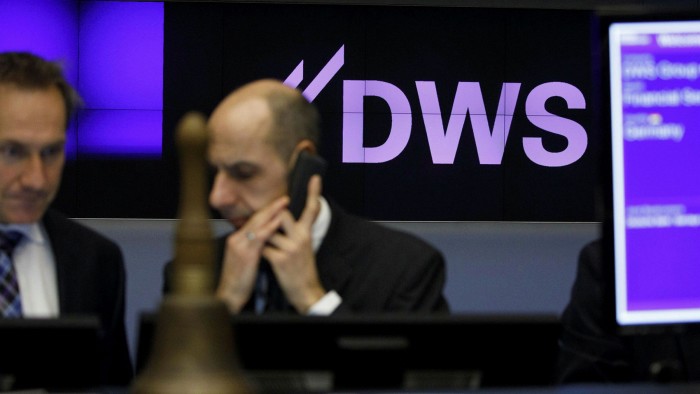DWS shares slide after greenwashing claims prompt BaFin investigation

Roula Khalaf, Editor of the FT, selects her favourite stories in this weekly newsletter.
Shares in German asset manager DWS fell more than 13 per cent on Thursday following reports that authorities in the US and Germany are investigating the €859bn group on claims that it misled clients about its sustainable investing efforts.
BaFin, the German regulator, has launched an investigation into DWS after the asset manager’s former head of sustainability alleged that it was misrepresenting how it used environmental, social and governance metrics to analyse companies across its entire investment platform, according to a person familiar with the matter.
BaFin said it would not comment on probes relating to individual companies, but that it did routinely investigate allegations of breaches in ESG requirements by funds in its jurisdiction. The BaFin investigation was first reported by Bloomberg.
US officials have also launched investigations over the same claims, according to a person familiar with the matter. The US investigation was first reported by the Wall Street Journal. The US Securities and Exchange Commission and Department of Justice have been asked for comment.
Desiree Fixler, who was sacked earlier this year from her role as global head of sustainability at DWS, alleged in an earlier report by the WSJ that misleading statements were made in DWS’s 2020 annual report, published in March, which claimed that more than half of its $900bn assets were invested using ESG criteria.
Fixler, a US citizen whose dismissal is being investigated by an employment tribunal in Germany, alerted the DWS management board about her concerns in early November 2020, a person briefed on the matter told the Financial Times.
Fixler claimed an internal assessment she had overseen had found that the ESG risk management system employed by DWS was highly flawed because it relied upon outdated technology and used ESG assessments provided by a range of external rating suppliers.
However, DWS portfolio managers were not required to take account of the ESG assessment when making investment decisions, the person said. This led to the inclusion of Wirecard, the disgraced payments company which crashed into insolvency earlier this year, in a dedicated ESG fund run by DWS.
DWS declined to comment “on questions related to litigation or regulatory matters” but said it “stands by its annual report disclosures” and firmly rejected the allegations. “DWS will continue to remain a steadfast proponent of ESG investing as part of its fiduciary role on behalf of its clients,” it said.
Marketing materials published by DWS claim that it has a long tradition of sustainable and responsible investing going back well over 20 years. Asoka Wöhrmann, who was promoted to the role of chief executive in 2018, has said that ESG is a cornerstone of DWS’s entire corporate strategy.
If regulators were to find that DWS overstated its ESG credentials, “possible outcomes could include a requirement to re-label funds, . . . pay compensation to clients who have been mis-sold ESG products or a fine,” Mandeep Jagpal, an analyst at RBC Capital Markets, wrote in a note.
“Even if the rumoured investigation was unable to verify that ESG claims had been overstated, the reputational damage to DWS could potentially hamper net flows in the future,” he added.
Asset managers have rushed to proclaim their sustainability credentials in recent years on the back of soaring demand for ESG investments. Total assets in funds branded sustainable hit $2.24tn in June, up from less than $1tn at the end of March 2020, according to data provider Morningstar.
But surging demand has coincided with fears of widespread “greenwashing”. European regulators have attempted to crack down on asset managers misrepresenting their ESG credentials with new rules which have introduced new investment categories and stricter disclosure requirements.
The investigation is a blow to Deutsche Bank, DWS’s majority shareholder. Deutsche’s chief executive Christian Sewing has made DWS a core pillar of his strategy to revive Germany’s largest lender. Asset management is a source of stable, fee-generating income not dependent on ultra-low interest rates and is a vital part of the bank’s ambitious ESG and net zero ambitions.
Reporting by Joe Miller, Chris Flood, Attracta Mooney and Stephen Morris
Comments